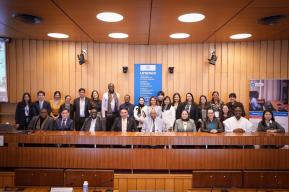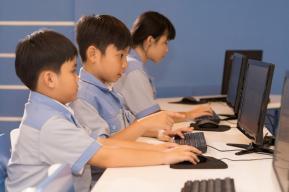News
Six best digital learning practices rewarded by the UNESCO Prize for ICT in Education

An exceptional Award Ceremony was organized at UNESCO Headquarters in Paris on 24 June to celebrate the six laureates of the UNESCO King Hamad Bin Isa Al-Khalifa Prize for the Use of ICT in Education. After a two-year postponement due to the COVID-19 pandemic, the event gathered the laureates of the 2019, 2020 and 2021 editions to feature the use of technology to enhance teaching, learning and overall education performance.
In his speech, H.E. Mr Majed Bin Ali Al-Noaimi lauded the Prize as one of the longest partnerships between the Kingdom of Bahrain and UNESCO. As highlighted by the Minister, “the laureate projects have showcased the technology-enabled initiatives aimed at expanding educational services across various circumstances that the world is witnessing.”
Ms Stefania Giannini underlined the significance of the Prize by stating that “when it was created in 2005 to showcase best practices in the use of technologies, this Prize was a trailblazer. Now, with the acceleration of the digital revolution, it’s a global reference that continues to evolve with our fast-changing times.” Reflecting on its valuable role in global advocacy, she reaffirmed that “we need to share and scale up tested solutions to leave no one behind and transform education systems, and today’s laureates offer a rich and inspiring array of ways forward.”
A Seminar was also organized on the same day to present the six laureates and one finalist project. In light of the Transforming Education Summit and its Action Track 4 on “Digital Learning and Transformation”, the event also contributed to the wider discussion of steering the use of digital technologies to reinforce open digital learning.
Best practices of using digital technology to achieve the common good of education
Since its establishment in 2005, the Prize calls for nominations under an annual theme designed to steer the use of technological innovations to address the fundamental challenges countries are facing in achieving the vision of SDG 4 – Education 2030.
The theme for 2019 was The use of Artificial Intelligence to innovate education, learning, and teaching, and two laureates were announced in 2020:
- “Letrus Writing Skills Program”, Letrus, Brazil: Letrus assists in improving the writing skills in Portuguese of primary and high school students through an adaptive online learning platform. Since 2014, the tool has been used in 957 schools by 1,327 teachers and 116,677 students, which has contributed to an average improvement of 10% after writing five essays on the platform.
- “Dytective”, Change Dyslexia, Spain: “Dytective” is an AI-empowered screening tool for the early detection of dyslexia in Spanish and a game-based learning environment for practising essential skills to support learners with dyslexia. Since 2016, with the help of the free screening tool, over 250,000 people in 42 countries were able to detect dyslexia for the first time.
The theme for 2020 was The use of Artificial Intelligence to enhance the continuity and quality of learning. Two laureates were selected in 2021:
- “One College Student Per Village” project, Open University of China, People’s Republic of China: Since 2017, with the help of the AI-powered solutions, the programme created quality online and offline learning environments for students residing in rural China. As of 2020, 538 online and offline learning environments have been created in 31 provinces with 825,827 learners enrolled in the scheme.
- “ViLLE”, Centre for Learning Analytics, University of Turku, Finland: The AI-enhanced platform supports teachers and individual learning paths of learners. As of 2020, 48% of Finish schools use the platform with approximately 300,000 students and more than 14,000 registered teachers who have created collaboratively more than 4,000 courses and 130,000 exercises via the “From Teachers to Teachers” initiative.
To draw lessons from the education response to the COVID-19 crisis, theme for 2021 was The use of technology to enable inclusive crisis-resilient learning systems. And the two laureates were selected in 2022:
- “Initiatives for Inclusive and Accessible Education”, Central Institute of Educational Technology (CIET), National Council for Educational Research and Training, India: The Initiatives provide multimodal access via TV channels, radios and several web portals and applications, reaching over 1.5 million schools, 240 million students and 8.5 million teachers. The learning content, which is also available for learners with special needs, includes 360 digitalized textbooks that are available in 11 local languages.
- “Digital Educational Programme”, Ubongo International, the United Republic of Tanzania: The programme leverages the power of entertainment, technologies, research and kid-centred design to bring effective and localized learning to school-age children and their parents. Since 2014, Ubongo’s TV and radio programmes have reached 27 million families through multiple platforms, boasting an 84% TV saturation rate and 50% radio saturation rate in Tanzania.
UNESCO Prize for ICT in Education: Steer the use of ICT as a common good for education
Since 2005, the UNESCO King Hamad Bin Isa Al-Khalifa Prize for the ICT in Education, supported by the Kingdom of Bahrain, rewarded 26 innovative projects from a diverse range of institutions and organizations. Two projects are selected from hundreds of entries each year, which have gone through a rigorous selection process and have been nominated by National Commissions to UNESCO or NGOs in official partnership with UNESCO. An external review of the Prize conducted in 2020 validated that the Prize presents special value-added in promoting universal access to information and knowledge, expanding learning opportunities through technologies, and promoting equitable and quality education for all.








